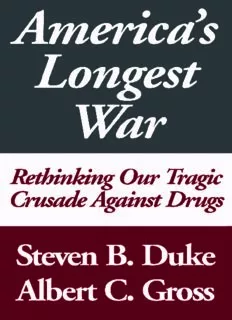
America's Longest War: Rethinking Our Tragic Crusade Against Drugs PDF
Preview America's Longest War: Rethinking Our Tragic Crusade Against Drugs
America’s Longest War America’s Longest War Rethinking Our Tragic Crusade Against Drugs Steven B. Duke and Albert C. Gross No part of this publication may be reproduced or transmitted in any form or by any means, electronic, or mechanical, including photocopy, recording, scanning or any information storage retrieval system, without explicit permission in writing from the Author. © Copyright 1982 by Steven B. Duke and Albert C. Gross First e-reads publication 1999 www.e-reads.com ISBN 0-7592-1347-X To our children, and to the memory of Paul Reynolds Table of Contents Acknowledgments vii Foreword by Kurt L. Schmoke x Preface xiii Chapter 1 An Overview: The Greater Evil 1 Chapter 2 Identifying the Enemy: "Drugs," "Drug Abuse," and Other Concepts 12 Chapter 3 Our Most Harmful Legal Drugs 22 Chapter 4 Our Most Popular Illegal Drugs 46 Chapter 5 Lessons from the Past 85 Chapter 6 The Crime Caused by Prohibition 112 Chapter 7 Freedom Costs 132 Chapter 8 Autonomy Costs 160 Chapter 9 Social Costs 177 Chapter 10 Health and Safety Costs 203 Chapter 11 The Drug War Cannot Succeed 225 Chapter 12 The Legalization Option 258 Chapter 13 Forms of Legalization 279 Chapter 14 A Harm Minimization Approach 310 America’s Longest War Acknowledgements [e-reads] Acknowledgements W E WISH to express our appreciation to the many people who helped us write this book. Without their generous contributions, much would be missing, although the opinions and all the short- comings of the book are of course our own responsibility. We are grateful for the helpful comments on various excerpts by profes- sors Charles Reich and Harlon Dalton of Yale Law School, and by Professors Joanne Conaghan, Charles Wiggins and Chris Wonnell, of the University of San Diego School of Law, by Professor Samuel Fetters of Syracuse Law School, by Yale Law School students Michele Anderson and Adrian LeBlanc, and by attorney Bruce Abbott. Publisher William F. Buckley, Jr., Princeton University professor Ethan Nadelmann and Rand Corporation economist Peter Reuter provided useful insights in telephone interviews. Corporate drug program consultant Robert Arganbright not only shared his extensive knowl- edge of the drug-abuse field and commented on parts of the manuscript but also located many valuable newspaper and magazine articles. Publications consultant Michael Johnson, judicial attorney Charles McKain, school psychologist John Pappas, educator Stephen Tadlock and administrator Peggy Whan helped us clarify ideas for the book by dis- vii Acknowledgements [e-reads] cussing or debating the issues. So did artist-author Bert Dodson and envi- ronmentalist Bonnie Dodson, advertising executive Ira Ginsburg, sociolo- gist Roberta Ginsburg, and countless students and colleagues at the Yale Law School. Attorneys Charles Andre, Lynn Casey, Christian Paul, Hal Tyvoll, and Herbert Pounder, medical technician Mary Lare, and engineer Paul Reynolds provided crucial insights and important sources of information. Susanne Bacon, of the Lexis Corporation, provided invaluable assistance by helping us locate essential research sources from her company’s computer data base. Gene Coakley of the Yale Law School Library was especially gen- erous and resourceful in finding for us primary and secondary sources. We could not have written the book without his help. We are indebted for the contributions of researchers Hank Garfield, Pamela MacKinnon, and Gloria Tierney, historian David Ritchie, attorneys Emily Shieh and Kevin Skehan, and journalists Allan Bock and Dean Latimer. Dr. H. Wayne Carver II, Chief Medical Examiner of Connecticut, taught us much about drugs, toxicology, and causes of death. Peter Ortego, a student at the University of Colorado School of Law, Luke Ryan of the University of San Diego School of Law, Curtis Mulkey and Gina Nagler of Golden Gate Law School, and Yale Law School students Roger Citron, Diana Jarvis, Carla Jones, Miriam Longchamp, Richard Manaloff, and Renee McDonald provided invaluable research assistance. The assistance of some went well beyond research. Dave Fratello, Assistant Director of Public Information, Drug Policy Foundation, and Eric E. Sterling, Coordinator, National Drug Strategy Network, read a draft and made many valuable suggestions. We thank Eunice Heidman, who word-processed parts of the manuscript and also called on her skills as a librarian to create a computer data base from thousands of newspaper and magazine clippings on drug topics. We also wish to express our appreciation to Sarah Nord, Susan Gonzales and, especially, Jill Tobey, for their superb secretarial assistance. Richard St. John, a Stanford undergraduate, helped us with both research and editing. viii Acknowledgements [e-reads] Literary agent Richard Curtis helped bring this project to fruition by remaining supportive during its more difficult moments. We are also grateful to editors Rick Benzel and Hank Stine and publisher Jeremy Tarcher, who took an active interest in the book from start to finish. Dean Guido Calabresi and the Yale Law School provided generous financial support of research. ix
